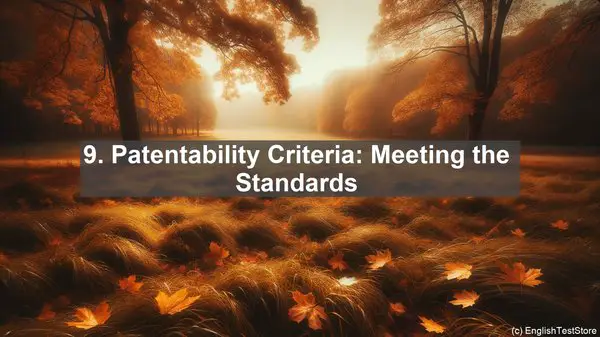Introduction: The Importance of English Idioms for Patent Agents
As a patent agent, your job involves not just technical expertise, but also effective communication. English idioms, with their figurative meanings, add depth and nuance to your conversations. Today, we’ll explore the top 10 idioms that are particularly relevant to your field.
1. A Patent Pending: The Waiting Game
When a patent application is under review, it’s said to be ‘patent pending.’ This idiom is often used to describe situations where you’re waiting for something to happen. For example, ‘We’re in a patent pending situation with that new invention.’

2. Infringing on Someone’s Territory: Legal Boundaries
In the world of patents, ‘infringement’ refers to unauthorized use of someone’s patented invention. Outside the legal context, this idiom is used to describe encroaching on someone’s domain or expertise. ‘John, don’t offer legal advice. You’re infringing on the lawyer’s territory.’
3. Prior Art: Building on Existing Knowledge
Before filing a patent, it’s crucial to conduct a ‘prior art’ search to ensure your invention is indeed novel. In everyday language, this idiom is used to refer to existing knowledge or ideas. ‘Our project is not groundbreaking; it’s just building on prior art.’
4. Patent Trolls: Exploiting the System
A ‘patent troll’ is someone who acquires patents not to manufacture or develop products, but to sue others for infringement. Outside the patent world, this term is used to describe someone who exploits legal loopholes for personal gain.
5. In the Public Domain: Free for All
When a patent or copyright expires, the invention or work enters the ‘public domain,’ becoming freely available for anyone to use. In general, this idiom is used to describe something that’s widely accessible or known. ‘The story of Cinderella is in the public domain; anyone can adapt it.’

6. Non-Obvious: Beyond Common Sense
To be patentable, an invention must be ‘non-obvious,’ meaning it shouldn’t be something that’s straightforward or common sense. In everyday conversations, this idiom is used to describe something that’s surprising or unexpected. ‘Her solution to the problem was non-obvious, but it worked.’
7. Infringement Damages: Compensation for Loss
When a patent is infringed, the patent holder can seek ‘infringement damages’ to compensate for the loss. Outside the legal context, this term is used to describe any compensation or reparation. ‘The company paid hefty infringement damages for stealing the competitor’s idea.’
8. Novelty Search: Uncovering the New
Before filing a patent, a ‘novelty search’ is conducted to ensure the invention is indeed new. In everyday language, this term is used to describe any search for something unique or original. ‘I did a novelty search for that book; it’s not like anything else out there.’
9. Patentability Criteria: Meeting the Standards
To be granted a patent, an invention must meet certain ‘patentability criteria,’ including novelty, non-obviousness, and usefulness. Outside the patent world, this term is used to describe any set of standards or requirements. ‘The candidate’s proposal didn’t meet the patentability criteria; it lacked novelty.’
10. Licensing Agreement: Sharing the Rights
When a patent holder allows someone else to use their invention, a ‘licensing agreement’ is signed, outlining the terms. In general, this term is used to describe any formal agreement for using or sharing something. ‘We need a licensing agreement to use that software.’
Conclusion: Mastering English Idioms for Professional Success
English idioms are not just linguistic quirks; they’re essential tools for effective communication. As a patent agent, understanding and using idioms correctly will not only enhance your professional image but also facilitate smoother interactions. So, make it a point to explore more idioms and incorporate them into your language. Thanks for watching, and see you in the next lesson!
